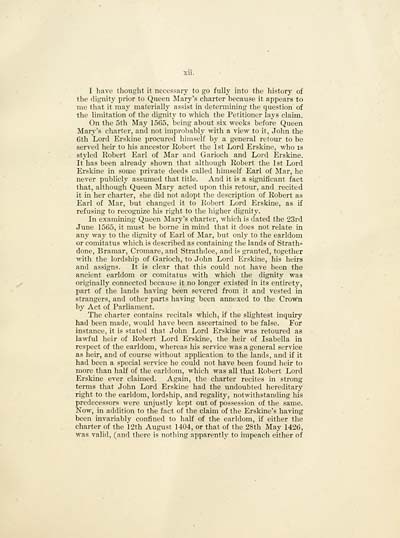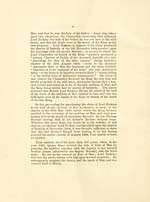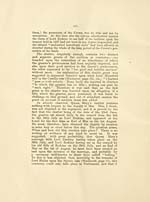Paper on the Mar peerage
(41) Page xii
Download files
Complete book:
Individual page:
Thumbnail gallery: Grid view | List view

I have thought it necessary to go fully into the history of
the dignity prior to Queen Mary's charter because it appears to
me that it may materially assist in determining the question of
the limitation of the dignity to which the Petitioner lays claim.
On the 5th May 1565, being about six weeks before Queen
Mary's charter, and not improbably with a view to it, John the
Cth Lord Erskine procured himself b}' a general retour to be
served heir to his ancestor Robert the 1st Lord Erskine, who is
styled Robert Earl of Mar and Garioeh and Lord Erskine.
It has been already shown that although Robert the 1st Lord
Erskine in some private deeds called himself Earl of Mar, he
never publicly assumed that title. And it is a significant fact
that, although Queen Mary acted upon this retour, and recited
it in her charter, she did not adopt the description of Robert as
Earl of Mar, but changed it to Robert Lord Erskine, as if
refusing to recognize his right to the higher dignity.
In examining Queen Mary's charter, which is dated the 23rd
June 1565, it must be borne in mind that it does not relate in
any way to the dignity of Earl of Mar, but only to the earldom
or comitatus which is described as containing the lands of Strath-
done, Bramar, Cromare, and Strathdee, and is granted, together
with the lordship of Garioeh, to John Lord Erskine, his heirs
and assigns. It is clear that this could not have been the
ancient earldom or comitatus with which the dignity was
originally connected because it no longer existed in its entirety,
part of the lands having been severed from it and vested in
strangers, and other parts having been annexed to the Crown
by Act of Parliament.
The charter contains recitals which, if the slightest inquiry
had been made, would have been ascertained to be false. For
instance, it is stated that John Lord Erskine was retoured as
lawful heir of Robert Lord Erskine, the heir of Isabella in
respect of the earldom, whereas his service was a general service
as heir, and of course without application to the lands, and if it
had been a special service he could not have been found heir to
more than half of the earldom, which was all that Robert Lord
Erskine ever claimed. Again, the charter recites in strong
terms that John Lord Erskine had the undoubted hereditary
right to the earldom, lordship, and regality, notwithstanding his
predecessors were unjustly kept out of possession of the same.
Now, in addition to the fact of the claim of the Erskine's having
been invariably confined to half of the earldom, if either the
charter of the 12th August 1404, or that of the 28th May 1426,
was valid, (and there is nothing apparently to impeach either of
the dignity prior to Queen Mary's charter because it appears to
me that it may materially assist in determining the question of
the limitation of the dignity to which the Petitioner lays claim.
On the 5th May 1565, being about six weeks before Queen
Mary's charter, and not improbably with a view to it, John the
Cth Lord Erskine procured himself b}' a general retour to be
served heir to his ancestor Robert the 1st Lord Erskine, who is
styled Robert Earl of Mar and Garioeh and Lord Erskine.
It has been already shown that although Robert the 1st Lord
Erskine in some private deeds called himself Earl of Mar, he
never publicly assumed that title. And it is a significant fact
that, although Queen Mary acted upon this retour, and recited
it in her charter, she did not adopt the description of Robert as
Earl of Mar, but changed it to Robert Lord Erskine, as if
refusing to recognize his right to the higher dignity.
In examining Queen Mary's charter, which is dated the 23rd
June 1565, it must be borne in mind that it does not relate in
any way to the dignity of Earl of Mar, but only to the earldom
or comitatus which is described as containing the lands of Strath-
done, Bramar, Cromare, and Strathdee, and is granted, together
with the lordship of Garioeh, to John Lord Erskine, his heirs
and assigns. It is clear that this could not have been the
ancient earldom or comitatus with which the dignity was
originally connected because it no longer existed in its entirety,
part of the lands having been severed from it and vested in
strangers, and other parts having been annexed to the Crown
by Act of Parliament.
The charter contains recitals which, if the slightest inquiry
had been made, would have been ascertained to be false. For
instance, it is stated that John Lord Erskine was retoured as
lawful heir of Robert Lord Erskine, the heir of Isabella in
respect of the earldom, whereas his service was a general service
as heir, and of course without application to the lands, and if it
had been a special service he could not have been found heir to
more than half of the earldom, which was all that Robert Lord
Erskine ever claimed. Again, the charter recites in strong
terms that John Lord Erskine had the undoubted hereditary
right to the earldom, lordship, and regality, notwithstanding his
predecessors were unjustly kept out of possession of the same.
Now, in addition to the fact of the claim of the Erskine's having
been invariably confined to half of the earldom, if either the
charter of the 12th August 1404, or that of the 28th May 1426,
was valid, (and there is nothing apparently to impeach either of
Set display mode to:
![]() Universal Viewer |
Universal Viewer | ![]() Mirador |
Large image | Transcription
Mirador |
Large image | Transcription
Images and transcriptions on this page, including medium image downloads, may be used under the Creative Commons Attribution 4.0 International Licence unless otherwise stated. ![]()
| Histories of Scottish families > Paper on the Mar peerage > (41) Page xii |
|---|
| Permanent URL | https://digital.nls.uk/94944302 |
|---|
| Description | A selection of almost 400 printed items relating to the history of Scottish families, mostly dating from the 19th and early 20th centuries. Includes memoirs, genealogies and clan histories, with a few produced by emigrant families. The earliest family history goes back to AD 916. |
|---|

